Inside the World of Laboratory Technicians: The Vital Role They Play in Science and Healthcare

Job description
A laboratory technician plays an important role in the field of science and research. They work in a laboratory, and their primary duty is to assist scientists, chemists, and other professionals in conducting research, running tests, and collecting data. Lab technicians work in various industries, including healthcare, agriculture, environmental science, and biotechnology.
Requirements
To become a lab technician, one must have at least an associate degree in a relevant field such as biology, chemistry, or medical technology. Some employers require a bachelor's degree in a specific field, while others provide on-the-job training. In addition to formal education, lab technicians should possess critical thinking skills, excellent attention to detail, and the ability to work independently or as part of a team. They must also be able to operate laboratory equipment and have knowledge of computer software applications related to their work.
Main Responsibilities
Lab technicians have a wide range of responsibilities, which include:
- Preparing and conducting experiments and tests: This is the primary responsibility of a lab technician. They work under the supervision of a scientist and assist in conducting research and experiments. They are responsible for setting up equipment, preparing samples, and following established procedures to ensure accurate results.
- Analyzing test results: After conducting tests, lab technicians are responsible for analyzing and interpreting the results. They use various techniques and methods to analyze data, including microscopy, chromatography, and spectrometry.
- Maintaining lab equipment: Lab technicians are responsible for maintaining and calibrating laboratory equipment, ensuring that all instruments are in good working condition. They also perform routine maintenance and repairs on laboratory equipment to prevent downtime and ensure accuracy.
- Documenting findings: Lab technicians must keep accurate records of their experiments and test results. They prepare reports and presentations on their findings, which they may present to other scientists, researchers, or clients.
Most common industry: The most common industry for laboratory technicians is the medical and diagnostic laboratory industry, followed by hospitals and physicians' offices.
Additional Duties
In addition to their primary responsibilities, lab technicians may be required to perform additional duties, including:
- Cleaning and sterilizing equipment: Lab technicians are responsible for cleaning and sterilizing laboratory equipment, ensuring that it is free from contamination.
- Ordering supplies: Lab technicians are responsible for ordering and maintaining inventory of laboratory supplies, including chemicals, reagents, and equipment.
- Training others: Lab technicians may be required to train new lab technicians, interns, or assistants on laboratory procedures and techniques.
- Adhering to safety protocols: Lab technicians must follow strict safety protocols to ensure that they and their colleagues are safe. They wear protective equipment, such as gloves and lab coats, and follow proper disposal procedures for hazardous waste.
Key Skills Required for the Job
Hard Skills | Description | Soft Skills | Description |
Laboratory Techniques | Knowledge of laboratory techniques, including handling and disposal of hazardous materials, calibration of equipment, and conducting experiments | Communication | Ability to interact effectively with scientists and other lab personnel, and to explain findings and ideas clearly |
Data Analysis | Ability to collect, analyze, and interpret data to help researchers and scientists understand their results | Detail-oriented | Ability to work with precision and attention to detail to avoid errors or contamination |
Technical Proficiency | Understanding of the technology used in the laboratory, such as software, instruments, and machinery | Time Management | Ability to manage time well to ensure that work is done efficiently and on schedule |
Record-Keeping | Ability to document experiment procedures and findings with clarity and precision, and keep accurate records of research procedures | Teamwork | Ability to work effectively as part of a team with scientists and other lab personnel |
Basic Chemistry and Biology | Understanding of basic chemistry and biology concepts to perform experiments, recognize anomalies in results, and understand reactions taking place in the lab | Critical Thinking | Ability to think critically, identify problems, conduct root-cause analysis, and develop effective solutions |
Laboratory Technician vs. Technologist
The main difference between a Laboratory Technician and a Technologist is their level of education and the complexity of the tasks they are responsible for performing in the laboratory.
A Laboratory Technician typically has an associate's degree or a certificate in a laboratory science program, and their duties include performing routine laboratory tests and procedures, preparing and analyzing samples, and maintaining laboratory equipment and records. They work under the supervision of laboratory technologists or laboratory managers.
A Laboratory Technologist, on the other hand, typically has a bachelor's degree in a laboratory science program, and their duties are more complex and advanced than those of a Technician. Technologists perform complex laboratory tests and procedures, interpret and analyze data, troubleshoot equipment and methodology issues, and may supervise or train Laboratory Technicians. They are often responsible for making decisions about testing procedures and ensuring that laboratory standards and quality control measures are maintained.
In summary, while both Laboratory Technicians and Technologists work in laboratory settings, Technologists are responsible for more complex and advanced tasks and require a higher level of education and training than Technicians.
The median age of Clinical laboratory technologists & technicians is 42.4, and Male employees are generally 2.36 years younger than than their Female counterparts.
Salary
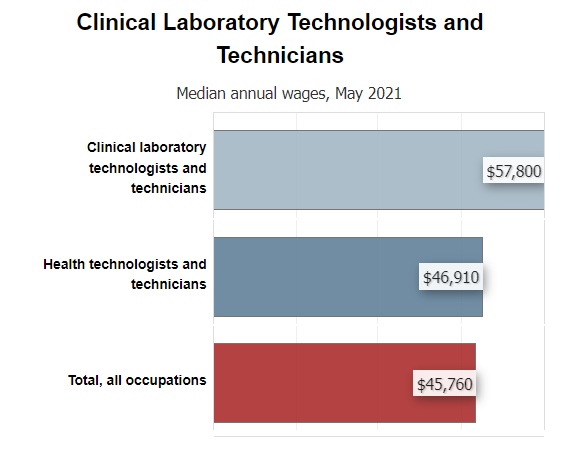
Source: U.S. Bureau of Labor Statistics
Average Salary
According to the U.S. Bureau of Labor Statistics (BLS), the median annual salary for medical and clinical laboratory technicians was $57,800 as of May 2021. The lowest 10 percent earned less than $30,280, while the highest 10 percent earned more than $79,340.
The salary for lab technicians can vary depending on the state in which they work. For instance, according to the BLS, the top paying states for medical and clinical laboratory technicians as of May 2020 were California, Massachusetts, District of Columbia, Alaska, and Rhode Island, with average annual salaries ranging from $64,500 to $77,980.
According to Payscale, the average hourly salary for a medical laboratory technician in the United States is $22.22 and for chemical laboratory technician is $19.56.
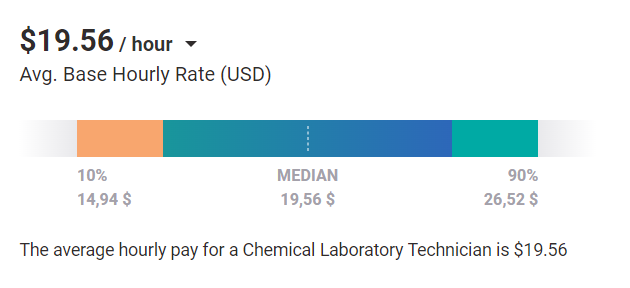
Source: PayScale
However, this may vary depending on factors such as education, experience, and location.
For example, Lab Technicians in California tend to earn higher hourly wages, with an average of $24.18 per hour, compared to Lab Technicians in Texas, who earn an average of $17.16 per hour.
Factors that Influence Earnings
Several factors can influence the earnings of lab technicians, including:
- Industry: The industry in which a lab technician works can greatly impact their salary. For example, lab technicians who work in research and development tend to earn more than those who work in diagnostic laboratories.
- Education and Experience: Generally, the more education and experience a lab technician has, the higher their salary. Technicians with certifications and advanced degrees are more likely to earn higher salaries.
- Location: The cost of living and the demand for lab technicians in a particular area can also affect their salary. For instance, lab technicians who work in metropolitan areas tend to earn more than those who work in rural areas.
- Job Title: Lab technicians can have different titles depending on their level of experience and responsibilities. Those with more senior positions, such as lab managers or supervisors, typically earn more than entry-level technicians.
Ways to Improve Earnings
Here are some ways lab technicians can increase their earnings:
- Pursue Additional Education or Certifications: Continuing education and obtaining certifications can help lab technicians improve their skills and knowledge, which can lead to higher salaries.
- Gain Experience: As mentioned earlier, experience is a key factor in earning a higher salary. Technicians can gain experience by taking on more responsibilities or pursuing higher-level positions.
- Negotiate Salary: When starting a new job or during performance reviews, lab technicians can negotiate their salary to ensure they are being paid what they are worth.
- Seek out higher-paying job opportunities: Lab Technicians can research and apply to higher-paying jobs at larger institutions, such as hospitals or research universities.
- Work overtime or take on extra shifts: Lab Technicians may be able to earn more money by working overtime or taking on extra shifts, depending on their employer's policies.
Additional Benefits
- Health Insurance: Many employers offer health insurance as part of their benefits package.
- Retirement Plans: Employers may offer retirement plans, such as 401(k) or pension plans, to help employees save for their future.
- Paid Time Off: Lab technicians may receive paid time off, such as vacation days or sick leave.
- Tuition Reimbursement: Some employers may offer tuition reimbursement programs to help employees pursue additional education or certifications.
- Continuing education opportunities: Employers who offer continuing education opportunities can help Lab Technicians stay up-to-date on the latest industry trends and skills, making them more valuable and potentially increasing their earning potential.
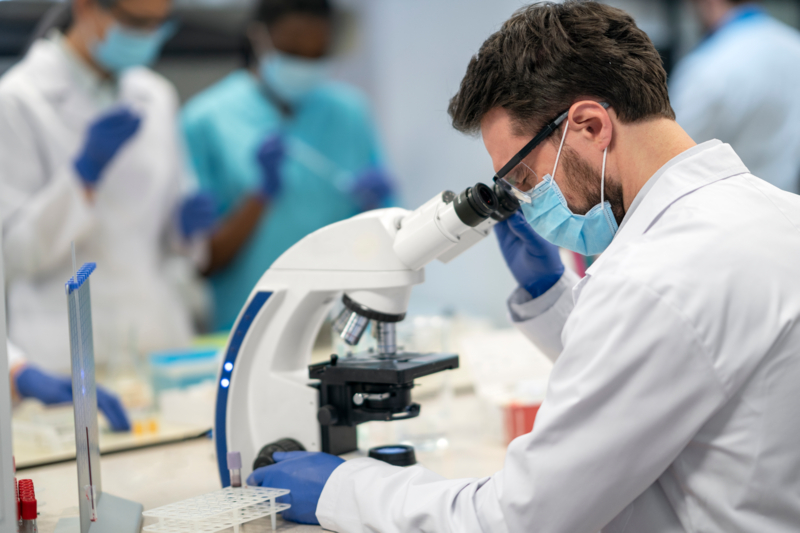
Photo: freepik
Job environment
As a Laboratory Technician, you will work in a laboratory environment where you will perform a variety of tests and procedures to assist physicians, scientists, and other professionals in the diagnosis and treatment of disease. The laboratory environment can vary depending on the type of laboratory you work in, but generally, there are some common settings and tools that you will encounter in your work.
Description of Settings and Tools
Laboratory Technicians may work in a variety of settings including:
- Hospitals: Many Laboratory Technicians work in hospitals, where they perform tests on patient samples to aid in the diagnosis and treatment of disease.
- Research and Development (R&D) Laboratories: In R&D labs, Laboratory Technicians may work on developing new products or testing the effectiveness of existing products.
- Biotech Companies: In biotech companies, Laboratory Technicians may work on developing new drugs or medical devices.
- Public Health Laboratories: In public health laboratories, Laboratory Technicians may work on testing for and identifying infectious diseases, foodborne illnesses, and other public health concerns.
Laboratory Technicians use a variety of tools and equipment to perform tests and procedures, including:
- Microscopes: Microscopes are used to examine samples at the cellular or microscopic level.
- Test tubes and pipettes: Test tubes and pipettes are used to handle and transport samples.
- Centrifuges: Centrifuges are used to separate different components of a sample, such as blood cells and plasma.
- Automated analyzers: Automated analyzers are used to perform a variety of tests on patient samples, such as blood tests.
- Computer software: Laboratory Technicians use computer software to record and analyze test results and to manage patient records.
Work Schedule
The work schedule for Laboratory Technicians can vary depending on the setting and the employer. In hospital settings, Laboratory Technicians may work in shifts, including evenings, weekends, and holidays, to ensure that tests are performed in a timely manner. In research or biotech settings, Laboratory Technicians may work more regular hours, but may also be expected to work longer hours or weekends during busy periods.
A Typical Working Day of a Laboratory Technician
Common tasks and responsibilities | Description |
Preparing samples for testing | Collecting, processing, and preparing patient samples for testing |
Performing tests | Conducting a variety of tests on patient samples following established procedures |
Analyzing test results | Interpreting test results and determining if further testing is needed |
Documenting test results | Accurately documenting test results in a laboratory information system or medical record |
Maintaining laboratory equipment | Ensuring laboratory equipment is functioning properly and maintained according to established procedures |
Following safety procedures | Adhering to strict safety procedures to protect themselves and others from exposure to hazardous materials and infectious diseases |
Collaborating with healthcare professionals | Working closely with physicians, nurses, and other healthcare professionals to ensure accurate test interpretation and appropriate patient treatment |
Participating in quality assurance activities | Participating in quality assurance activities such as proficiency testing and quality control to ensure accurate and reliable laboratory testing |
Education

Laboratory Technicians are typically required to have a degree or certification in a laboratory science program. The specific level of education required may vary depending on the employer and the specific job requirements.
Bachelor's Degree
A Bachelor's degree in a laboratory science program is the most common requirement for entry-level Laboratory Technician positions. These programs typically take four years to complete and include coursework in areas such as biology, chemistry, microbiology, and laboratory procedures. Graduates of these programs are prepared to perform basic laboratory tests and procedures under the supervision of laboratory technologists or laboratory managers.
Master's Degree
A Master's degree in a laboratory science program may be required for more advanced Laboratory Technician positions or for career advancement. These programs typically take two years to complete and may include coursework in areas such as laboratory management, research methods, and advanced laboratory techniques.
Ph.D.
A Ph.D. in a laboratory science program is typically required for research or teaching positions in the laboratory sciences. These programs can take four to six years to complete and include coursework in areas such as advanced laboratory techniques, research methods, and statistics. Ph.D. graduates may also be required to complete a dissertation or research project.
Postdoctoral Fellowship
After completing a Ph.D. program, some laboratory scientists may choose to complete a postdoctoral fellowship. This is a temporary position that allows scientists to gain additional research experience and further their research skills. Postdoctoral fellowships typically last two to three years and are often required for academic or research positions.
The most common degree for laboratory technicians is bachelor's degree 61% of laboratory technicians earn that degree. A close second is associate degree with 18% and rounding it off is high school diploma with 9%.
Professional Associations
American Society for Clinical Laboratory Science (ASCLS)
ASCLS is a professional organization for clinical laboratory scientists, medical laboratory technicians, and laboratory professionals. The organization provides educational resources, professional development opportunities, advocacy, and networking opportunities for its members. ASCLS is committed to promoting excellence in the field of clinical laboratory science and advocating for the value of laboratory professionals in the healthcare system.
American Association for Clinical Chemistry (AACC)
AACC is an international scientific and medical professional organization dedicated to clinical laboratory science and its application to healthcare. The organization provides education and professional development opportunities, research grants, and advocacy for its members. AACC is committed to promoting the value of laboratory medicine in healthcare, advancing the science of laboratory medicine, and improving patient care.
National Society for Histotechnology (NSH)
NSH is a professional organization for histotechnologists and histotechnicians, professionals who prepare tissue samples for examination by a pathologist. The organization provides educational resources, professional development opportunities, advocacy, and networking opportunities for its members. NSH is committed to promoting excellence in the field of histotechnology, advocating for the value of histology professionals in the healthcare system, and advancing the science of histotechnology.
American Medical Technologists (AMT)
A professional association that provides certification and continuing education programs for medical laboratory professionals. The organization also offers networking opportunities and advocacy for the profession.
Clinical Laboratory Management Association (CLMA)
A professional association for laboratory managers and administrators. The organization provides educational resources, networking opportunities, and advocacy for the profession.
Each of these organizations provides a range of benefits and resources for laboratory professionals, including professional development opportunities, advocacy for the profession, and networking opportunities with other professionals in the field. By joining one or more of these organizations, laboratory technicians can stay up-to-date with the latest developments in their field, connect with other professionals, and advance their careers.
Licenses and Certifications
Many states require Laboratory Technicians to be licensed or certified to work in a laboratory setting. Certification is typically voluntary, but it can demonstrate competence and knowledge in the field. Some of the certifications available for Laboratory Technicians include the Medical Laboratory Technician (MLT) certification from the American Society for Clinical Pathology (ASCP) and the Clinical Laboratory Technician (CLT) certification from the National Accrediting Agency for Clinical Laboratory Sciences (NAACLS).
Medical Laboratory Technician (MLT) certification
This certification is offered by the American Society for Clinical Pathology (ASCP) and is designed for individuals who have completed an accredited medical laboratory technician program and have a minimum of an associate's degree in laboratory science or a related field. The certification requires passing an exam that covers the knowledge and skills needed to work as a medical laboratory technician. The exam covers areas such as clinical chemistry, hematology, microbiology, immunology, and laboratory operations.
Clinical Laboratory Technician (CLT) certification
This certification is offered by the National Accrediting Agency for Clinical Laboratory Sciences (NAACLS) and is designed for individuals who have completed an accredited clinical laboratory technician program and have a minimum of an associate's degree in laboratory science or a related field. The certification requires passing an exam that covers the knowledge and skills needed to work as a clinical laboratory technician. The exam covers areas such as hematology, clinical chemistry, immunology, microbiology, and laboratory operations.
Both the MLT and CLT certifications are recognized by many employers and states, and are often required for licensure or employment in a laboratory setting. The certifications demonstrate that the laboratory technician has met a minimum level of competency in their field and is committed to ongoing education and professional development. To maintain their certification, laboratory technicians must complete continuing education requirements and/or re-certification exams every few years.
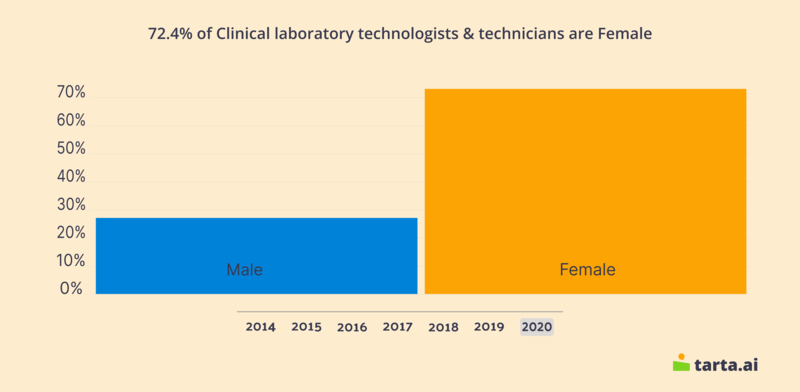
Career Paths
Ways of career development
- Pursue additional education: Laboratory technicians can pursue further education in a related field, such as a bachelor's or master's degree in science or a related field, to expand their knowledge and increase their career opportunities.
- Attend training and professional development programs: Laboratory technicians can attend workshops, seminars, or conferences to learn new skills and techniques and stay up-to-date with the latest developments in their field.
- Obtain certifications: There are several certifications available for laboratory technicians, such as the Medical Laboratory Technician (MLT) or Medical Technologist (MT) certifications, which can enhance their professional credentials and increase their job prospects.
- Seek out mentorship opportunities: Experienced laboratory technicians can mentor new technicians or seek out mentorship opportunities from senior professionals in their field to gain valuable insights and guidance.
- Consider specialization: Laboratory technicians can specialize in a particular area of laboratory science, such as microbiology, hematology, or histology, to increase their knowledge and skills in a particular area and become experts in their field.
- Network with peers and industry professionals: Laboratory technicians can attend professional events or join industry associations to connect with other professionals in their field, build their professional network, and learn about job opportunities or trends in their industry.
Subfields and Specializations
Laboratory Technicians can specialize in a variety of subfields within laboratory science. For example, they may focus on hematology, which involves the analysis of blood samples, or microbiology, which focuses on the identification and analysis of microorganisms. Other subfields include clinical chemistry, immunology, and histology. By specializing in a particular subfield, Laboratory Technicians can gain expertise in a specific area and become sought-after experts in their field.
Laboratory Technicians can also specialize in specific types of laboratory testing. For example, they may specialize in molecular diagnostics, which involves the detection of DNA and RNA. Other specializations include flow cytometry, which is used to analyze cells, and blood banking, which involves the collection and analysis of blood and blood products. By specializing in a specific area of laboratory testing, Laboratory Technicians can gain valuable expertise and become sought-after professionals.
Alternative Careers and Similar Jobs for Laboratory Technicians
Job Title | Job Description | Work Setting |
Research Technician | Conduct experiments, collect data, and analyze results in laboratory settings. | Biology, chemistry, physics labs, or other research facilities. |
Quality Control Technician | Ensure products meet certain quality standards in manufacturing plants or industrial settings. | Manufacturing plants, factories, or other industrial settings. |
Forensic Science Technician | Collect and analyze evidence from crime scenes to help solve crimes. | Law enforcement agencies, medical examiner's offices, or private labs. |
Environmental Science Tech | Collect and analyze data from the natural world to understand the impact of human activity on the environment. | Government agencies, non-profit organizations, or consulting firms. |
Pathology Assistant | Work alongside pathologists to examine tissue samples and diagnose diseases. | Hospitals, medical labs, or research facilities. |
Clinical Research Coord | Oversee clinical trials and medical research studies. | Pharmaceutical companies, universities, or hospitals. |
Biostatistician | Analyze data from medical and public health studies using statistical methods. | Government agencies, research institutions, or pharmaceutical companies. |
Medical Laboratory Scientist | Perform more complex laboratory tests than technicians with a bachelor's degree in medical laboratory science. | Hospitals, medical labs, or research facilities. |
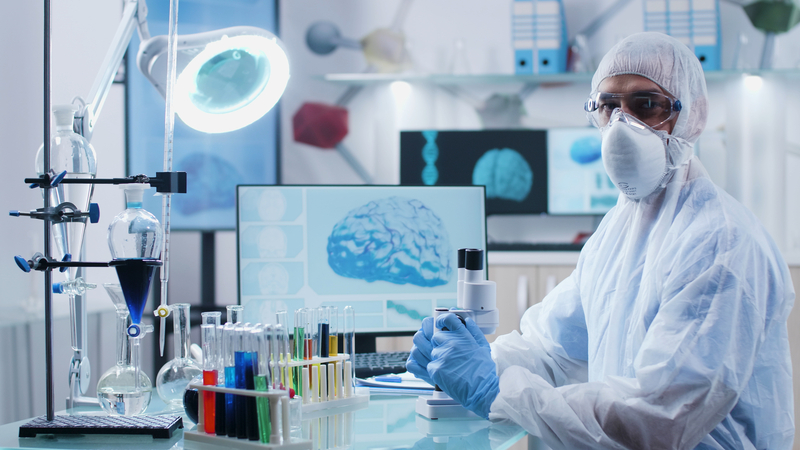
Photo: DCStudio/freepik
Job Market
The job market for laboratory technicians varies depending on the specific industry and location.
Demand for laboratory technicians is expected to grow as the need for medical and scientific research continues to expand. According to the Bureau of Labor Statistics, employment of medical and clinical laboratory technicians is projected to grow 7% from 2021 to 2031, which is faster than the average for all occupations. About 25,600 openings for clinical laboratory technologists and technicians are projected each year, on average, over the decade. Demand for laboratory technicians in other industries, such as biotechnology and environmental science, is also expected to increase.
The outlook for laboratory technicians is generally positive, with opportunities for advancement and specialization. With additional training and education, laboratory technicians may be able to move into supervisory or management positions, or pursue careers in research or academia.
Part-time job opportunities for laboratory technicians may be available in certain settings, such as hospitals or research facilities that operate on a 24-hour schedule. However, part-time opportunities may be more limited than full-time positions, and may not be available in all locations or industries. Additionally, part-time positions may not offer the same opportunities for advancement or benefits as full-time positions.
Job satisfaction
As with any profession, laboratory technicians can experience both advantages and disadvantages in their job, which can impact their job satisfaction.
Advantages of being a laboratory technician
- Opportunity for hands-on work: Laboratory technicians typically perform hands-on work, conducting experiments, and analyzing samples. This can be a satisfying aspect of the job, as it allows individuals to engage in work that is both challenging and rewarding.
- Job security: As mentioned earlier, the demand for laboratory technicians is expected to grow in the coming years, which means that there is a relatively high level of job security in this field.
- Variety of work environments: Laboratory technicians can work in a variety of settings, including hospitals, research facilities, and government agencies. This variety can provide opportunities for individuals to explore different areas of interest within the field.
Disadvantages of being a laboratory technician
- Risk of exposure to hazardous materials: Some laboratory technicians may be required to work with hazardous materials, which can pose a risk to their health and safety. Proper safety protocols must be followed to minimize these risks.
- Repetitive work: Depending on the specific job duties, laboratory technicians may perform similar tasks on a regular basis, which can be monotonous and boring.
- Low pay: Although laboratory technicians play a critical role in scientific research and development, their salaries may be lower than those of other professionals with similar education and experience.
Work Challenges
Like any profession, laboratory technicians can face challenges in their work. Here are some common challenges that laboratory technicians may encounter:
- Time constraints: Laboratory technicians may have to work within strict time constraints, particularly when conducting experiments or analyzing samples for time-sensitive projects. This can lead to high levels of stress and pressure to meet deadlines.
- Technical difficulties: Laboratory technicians may encounter technical difficulties when using equipment or performing experiments. This can lead to delays and frustrations when trying to complete work.
- Quality control: Laboratory technicians are responsible for ensuring that all data and results are accurate and reliable. This requires strict attention to detail and adherence to quality control protocols.
- Collaboration with colleagues: Laboratory technicians may work in teams with other scientists, researchers, and technicians. Effective communication and collaboration are crucial to success in these settings, but differing opinions or work styles can sometimes cause friction or conflict.
- Adapting to new technologies: The field of laboratory science is constantly evolving, and laboratory technicians must stay up-to-date with new technologies and techniques. This requires a willingness to learn and adapt to new technologies and methods.
Government Programs
There are several government programs available to support laboratory technicians. Here are a few examples:
Agency/Program | Description |
Provides funding for job training programs, including those focused on laboratory science and technology. Helps laboratory technicians gain new skills and improve employability. | |
Provides funding for research and education in various fields, including laboratory science. Laboratory technicians can apply for funding to support research projects or participate in training and educational programs. | |
Provides resources and support for laboratory technicians and scientists in various fields. This includes research programs, training opportunities, and access to specialized equipment and facilities. | |
Offers a variety of programs and resources to support job training and career development for laboratory technicians. Includes apprenticeship programs, career counseling services, and funding for training and education. | |
Offers training and education programs for laboratory technicians and other scientists working in biomedical research. Provides hands-on training, mentorship opportunities, and access to research facilities and equipment. |
Overall, these government programs can provide valuable support for laboratory technicians seeking to improve their skills, knowledge, and employability in the field.
- Lab technicians play an essential role in the field of science and research. They assist scientists and researchers in conducting experiments and analyzing data, maintain laboratory equipment, and adhere to strict safety protocols.
- A lab technician needs to have a solid foundation of laboratory techniques and technical proficiency, combined with strong communication skills, attention to detail, and the ability to work effectively as part of a team.
- The employment of laboratory technicians is projected to grow 7% from 2021 to 2031, which is faster than the average for all occupations.
- The median annual wage for medical and clinical laboratory technologists and technicians was $57,80 as of May 2021, according to the U.S. Bureau of Labor Statistics.
- Those who enjoy hands-on work and are interested in scientific research may find this profession fulfilling.
- Laboratory technicians face challenges in their work, such as time constraints, technical difficulties, and collaboration with colleagues
- Government programs, such as the Workforce Investment Act and National Science Foundation, provide support for laboratory technicians in training and career development.
FAQ
What are some common job duties of a laboratory technician?
Collecting and analyzing samples, conducting experiments, maintaining laboratory equipment, recording data, and communicating findings to other scientists or healthcare professionals.
What is the difference between a laboratory technician and a laboratory technologist?
The main difference is in their level of education and training. Laboratory technologists typically have a bachelor's degree in a related field, while laboratory technicians often have an associate's degree or a certificate. Technologists may have more advanced responsibilities and may supervise technicians.
Can laboratory technicians work part-time or on a flexible schedule?
Yes, some laboratory technician positions may offer part-time or flexible schedules. This can be especially common in healthcare settings, such as hospitals or clinics.
What is the role of laboratory technicians in COVID-19 testing and research?
Laboratory technicians have played a critical role in COVID-19 testing and research, as they are responsible for collecting and analyzing patient samples to detect the virus.
What advancements in technology are affecting the laboratory technician field?
Advancements in technology are constantly changing the laboratory technician field. For example, automation and robotics are becoming increasingly common in laboratory settings, which can help to streamline processes and reduce errors.
What education is required to become a laboratory technician?
Education requirements can vary depending on the specific job and employer, but most laboratory technician positions require at least an associate's degree in a related field, such as biology, chemistry, or medical technology.